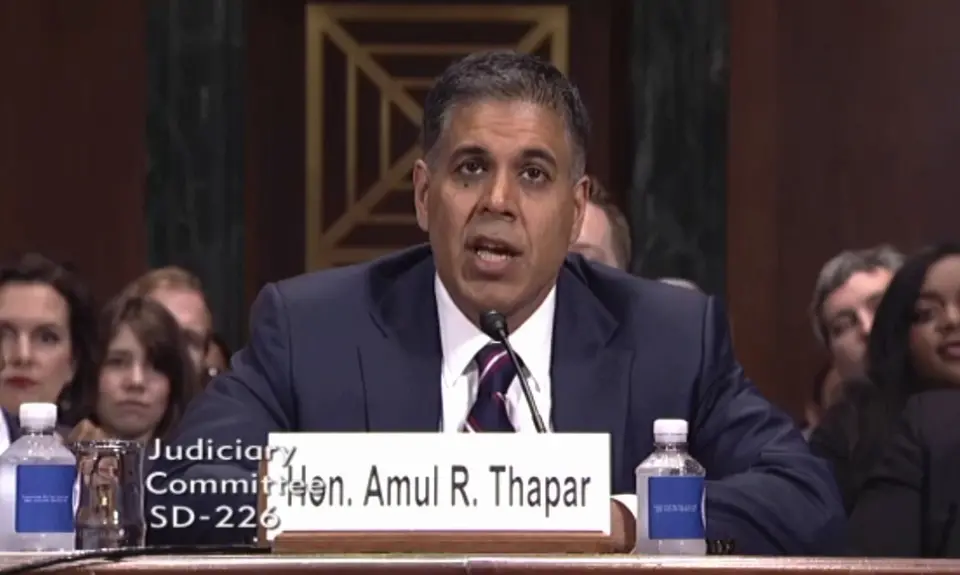“Confirmed Judges, Confirmed Fears” is a blog series documenting the harmful impact of President Trump’s judges on Americans’ rights and liberties. Cases in the series can be found by issue and by judge at this link.
Trump 6th Circuit judge Amul Thapar defended and tried to extend even further a previous ruling in which he cast the deciding vote to allow the government to continue to hold without bail an immigrant who had already been in custody for almost three years. The November 2020 decision that denied full court rehearing of the case is Martinez v LaRose.
As explained in an earlier PFAW blog post, Walter Melara Martinez fled from El Salvador to the United States, where his common-law wife and two children are legal permanent residents, after he was beaten and threatened by the MS-13 gang and government officials. The US government took him into custody in December 2017, and he has remained in prison as proceedings continue to try to prevent his deportation despite an order of removal, because of concern about torture and persecution in El Salvador. After he had been in custody for 18 months, he filed a petition contending that his continued detention without a hearing on whether he can be released on bond violated due process. Trump judge Thapar was the deciding vote in a 2-1 Sixth Circuit decision that affirmed the denial of Martinez’s petition, despite a dissent by a judge appointed by George W Bush that concluded that the Constitution “does not countenance” such continued detention without a hearing. The Trump DHS has continued to hold Martinez.
The full Sixth Circuit denied rehearing of the case. Although the court did not report who voted against rehearing, it appears that with the exception of Judge Chad Readler, who did not participate, all the other Trump judges on the court (John Bush, Joan Larsen, Eric Murphy, and John Nalbandian) were against rehearing.
Trump judge Thapar wrote a concurring opinion, in which he argued that the recent Supreme Court decision in the Thuraissigiam case concerning detention of immigrants not only supported the panel decision but also “undermines” a previous Sixth Circuit ruling against indefinite detention of immigrants like Martinez. Thapar maintained that the Court’s recent holding means that immigrants like Martinez have essentially no rights under the Constitution, and “are entitled only to such process as the political branches afford them.” Martinez thus has no due process right, as Thapar put it, to be generally “release[d] into the United States.” In addition, Thapar asserted, the Supreme Court ruling means that the Sixth Circuit’s earlier decision in the Rosales-Garcia case, which held that INS detention of several immigrants like Martinez for more than four years was improper, is “no longer good law.”
Judge Karen Nelson Moore, joined by Judges Jane Stranch and Bernice Donald, strongly dissented and demonstrated the flaws in Thapar’s analysis. The Supreme Court has previously ruled, the dissent explained, that immigrants like Martinez who are contesting their removal can maintain that their continued imprisonment for periods of more than six months is “no longer reasonable” under the Constitution’s due process clause. This does not mean that they would simply be allowed to live in the US “at large”, Judge Moore noted in response to Thapar’s suggestion, but instead would be subject to “supervision under release conditions that may not be violated.” The Thuraissigiam decision, Moore continued, “neither addressed nor disturbed this holding,” and instead ruled only that in the circumstances of that case, the individual could not file an immediate petition to be released from custody during “pre-removal hearings.” Thuraissigiam also did not warrant overruling the Sixth Circuit’s Rosales-Garcia precedent, Moore went on, and it is clearly “not appropriate to attempt to overturn our established precedent on the basis of the musings of one judge concurring in the denial of a petition for rehearing.”
Judge Moore also demonstrated why the full court should have reheard Martinez’s case. Agreeing with Judge Gibbons’ dissent, she pointed out that the panel decision has “grave consequences for the many detainees” who, like Martinez, are “pursuing non-frivolous claims that they will face torture or persecution if released to a particular country.” The panel’s ruling, Moore continued, “is effectively punishing them for pursuing applicable legal remedies,” and the “serious liberty interests implicated by this case merit” review by the full court. Unfortunately, as a result of Trump judges on the Sixth Circuit like Thapar, that full court review will not occur. Hopefully, after January 20, the “political branches” will determine that people like Martinez should get some relief.
